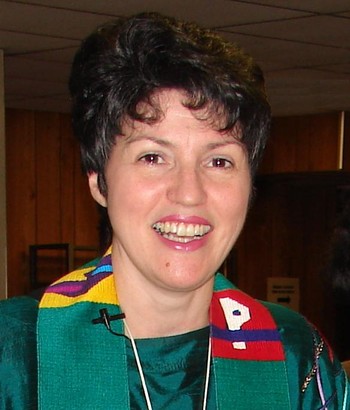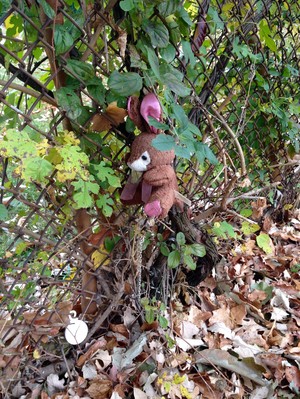A space for a contemporary woman disciple to give voice to justice concerns in a world where some still think that women’s words are just leros (Greek for “nonsense”) or, in Spanish, disparates
 Clinging people
Clinging people
A resource for Sunday’s liturgy based on Ruth 1:6–14 and Mark 12:28–31
by Magdalena I. García
Then [Naomi] started to return with her daughters-in-law from the country of Moab, for she had heard in the country of Moab that the Lord had considered his people and given them food. So she set out from the place where she had been living, she and her two daughters-in-law, and they went on their way to go back to the land of Judah. But Naomi said to her two daughters-in-law, “Go back each of you to your mother’s house. May the Lord deal kindly with you, as you have dealt with the dead and with me. The Lord grant that you may find security, each of you in the house of your husband.” Then she kissed them, and they wept aloud. They said to her, “No, we will return with you to your people.” But Naomi said, “Turn back, my daughters, why will you go with me? Do I still have sons in my womb that they may become your husbands? Turn back, my daughters, go your way, for I am too old to have a husband. Even if I thought there was hope for me, even if I should have a husband tonight and bear sons, would you then wait until they were grown? Would you then refrain from marrying? No, my daughters, it has been far more bitter for me than for you, because the hand of the Lord has turned against me.” Then they wept aloud again. Orpah kissed her mother-in-law, but Ruth clung to her. —Ruth 1:6–14
One of the scribes came near and heard them disputing with one another, and seeing that he answered them well, he asked him, “Which commandment is the first of all?” Jesus answered, “The first is, ‘Hear, O Israel: the Lord our God, the Lord is one; you shall love the Lord your God with all your heart, and with all your soul, and with all your mind, and with all your strength.’ The second is this, ‘You shall love your neighbor as yourself.’ There is no other commandment greater than these.” —Mark 12:28–31
some cultures train their young
to be self-sufficient and independent
and worry if their offspring fail to take off,
crowding up the place for mom and dad
draining the budget, clearing the fridge,
and regard anyone who needs an extra hand
as deficient, a failure, a burden
other cultures train their young
to be cooperative and interdependent
and worry if offspring take off too soon,
leaving behind their siblings and kinfolk
abandoning the nest, severing the roots,
and consider anyone who extends a helping hand
as warmhearted, compassionate, caring
so just for the record, it’s nice to know
that our faith’s family tree includes a clinger
who was not diagnosed with an emotional disorder
but joined Jesus’ kin by hanging on to her mother-in-law
and became a symbol of God’s persistent love
and just for once it’s nice to remember
that our faith calls us to be a clinging people
who don’t let anyone fall through the cracks
and that this is how we become the people of the way
and the embodiment of God’s steadfast love each day
Forgive us, Cradling God,
for failing to comfort all your children
and to surround them with your tender love.
Remind us, Clutching God,
that loving our neighbor involves an enduring bond
and the willingness to share your unfaltering love.
Help us, Clinging God,
to be eager to alleviate the suffering of the world
and to embrace all humanity with your abiding love.
Magdalena I. García is a PC(USA) teaching elder and a hospice chaplain for Vitas Healthcare in Chicago. She is a graduate of McCormick Theological Seminary and a recipient of the 2008 PC(USA) Women of Faith Award. For permission to use content, write to magdalenagarcia@comcast.net.

Tree branches and a token of love cling to a cemetery fence next to a grave.
Gente Aferrada
Un recurso para la liturgia dominical basado en Ruth 1:6–14 y Marcos 12:28–31
por Magdalena I. García
Noemí regresó de la tierra de Moab con sus dos nueras, porque allí se enteró de que el Señor había acudido en ayuda de su pueblo al proveerle de alimento. Salió, pues, con sus dos nueras del lugar donde había vivido, y juntas emprendieron el camino que las llevaría hasta la tierra de Judá. Entonces Noemí les dijo a sus dos nueras: “¡Miren, vuelva cada una a la casa de su madre! Que el Señor las trate a ustedes con el mismo amor y lealtad que ustedes han mostrado con los que murieron y conmigo. Que el Señor les conceda hallar seguridad en un nuevo hogar, al lado de un nuevo esposo”. Luego las besó. Pero ellas, deshechas en llanto, alzaron la voz y exclamaron: “¡No! Nosotras volveremos contigo a tu pueblo”. “¡Vuelvan a su casa, hijas mías!”, insistió Noemí. “¿Para qué se van a ir conmigo? ¿Acaso voy a tener más hijos que pudieran casarse con ustedes? ¡Vuelvan a su casa, hijas mías! ¡Váyanse! Yo soy demasiado vieja para volver a casarme. Aun si abrigara esa esperanza, y esta misma noche me casara y llegara a tener hijos, ¿los esperarían ustedes hasta que crecieran? ¿Y por ellos se quedarían sin casarse? ¡No, hijas mías! Mi amargura es mayor que la de ustedes; ¡la mano del Señor se ha levantado contra mí!” Una vez más alzaron la voz, deshechas en llanto. Luego Orfa se despidió de su suegra con un beso, pero Rut se aferró a ella. —Ruth 1:6–14
Uno de los escribas, que había estado presente en la discusión y que vio lo bien que Jesús les había respondido, le preguntó: “De todos los mandamientos, ¿cuál es el más importante?” Jesús le respondió: “El más importante es: ‘Oye, Israel: el Señor, nuestro Dios, el Señor es uno’. Y ‘amarás al Señor tu Dios con todo tu corazón, y con toda tu alma, y con toda tu mente y con todas tus fuerzas’. El segundo en importancia es: ‘Amarás a tu prójimo como a ti mismo’. No hay otro mandamiento más importante que éstos”. —Marcos 12:28–31
algunas culturas entrenan a sus críos
para ser autosuficientes e independientes
y se preocupan si su descendencia tarda en despegar
apiñando la casa de mamá y papá
drenando el presupuesto, despejando la nevera
y consideran a cualquiera que necesite ayuda adicional
como deficiente, un fracaso, una carga
otras culturas entrenan a sus crías
para ser cooperativas e interdependientes
y se preocupan si su descendencia se apresura en despegar
dejando atrás a sus hermanos y su parentela
abandonando el nido, cortando las raíces
y consideran a cualquiera que extienda apoyo adicional
como una persona cálida, compasiva, cariñosa
y sólo para que conste es bueno saber
que el árbol de nuestra familia de fe incluye una aferrada
que no fue diagnosticada con un desorden emocional
y que por agarrarse de su suegra con Jesús se emparentó
y en símbolo del amor persistente de Dios se convirtió
y al menos por una vez es bueno recordar
que nuestra fe nos llama a ser gente aferrada
que no permita que nadie se quede a la deriva
y que es así como nos convertimos en pueblo del camino
y en la personificación del Dios de amor constante y genuino
Perdónanos, Dios Acunador,
por fallar en consolar a todos tus hijos e hijas
y por no rodearles con tu tierno amor.
Recuérdanos, Dios Asidor,
que amar a nuestro prójimo implica un vínculo duradero
y la voluntad de compartir tu inquebrantable amor.
Ayúdanos, Dios Aferrador,
a estar deseosos de aliviar el sufrimiento terrenal
y a abrazar a la humanidad con tu perdurable amor.
Magdalena I. García es anciana docente en la IP(EUA) y capellana de hospicio para Vitas Healthcare en Chicago. Se graduó del Seminario Teológico McCormick y recibió el Premio a las Mujeres de Fe de su denominación en el 2008. Para solicitar permiso para usar el contenido, escriba a: magdalenagarcia@comcast.net.